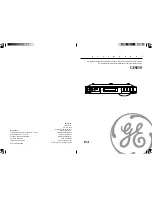
-3-
Keep handles dry, clean and free from oil
and grease.
Slippery hands cannot safely
control the power tool.
Power tool use and care
Do not force the power tool. Use the
correct power tool for your application.
The correct power tool will do the job better
and safer at the rate for which it was
designed.
Do not use the power tool if the switch
does not turn it on and off.
Any power tool
that cannot be controlled with the switch is
dangerous and must be repaired.
Disconnect the plug from the power
source and/or the battery pack from the
power tool before making any
adjustments, changing accessories, or
storing power tools.
Such preventive safety
measures reduce the risk of starting the
power tool accidentally.
Store idle power tools out of the reach of
children and do not allow persons
unfamiliar with the power tool or these
instructions to operate the power tool.
Power tools are dangerous in the hands of
untrained users.
Maintain power tools. Check for
misalignment or binding of moving parts,
breakage of parts and any other condition
that may affect the power tools operation.
If damaged, have the power tool repaired
before use.
Many accidents are caused by
poorly maintained power tools.
Keep cutting tools sharp and clean.
Properly maintained cutting tools with sharp
cutting edges are less likely to bind and are
easier to control.
Use the power tool, accessories and tool
bits etc., in accordance with these
instructions and in the manner intended
for the particular type of power tool,
taking into account the working
conditions and the work to be performed.
Use of the power tool for operations different
from those intended could result in a
hazardous situation.
Use clamps or other practical way to
secure and support the workpiece to a
stable platform.
Holding the work by hand
or against your body is unstable and may
lead to loss of control.
Service
Have your power tool serviced by a
qualified repair person using only identical
replacement parts.
This will ensure that the
safety of the power tool is maintained.
Develop a periodic maintenance schedule
for your tool. When cleaning a tool be
careful not to disassemble any portion of
the tool since internal wires may be
misplaced or pinched or safety guard
return springs may be improperly
mounted.
Certain cleaning agents such as
gasoline, carbon tetrachloride, ammonia, etc.
may damage plastic parts.
SAVE THESE INSTRUCTIONS
Safety Rules for Planers
Secure the material being planed. Never
hold it in your hand or across legs.
Small
workpiece must be adequately secured so
that the rotating planer blades will not pick it
up during forward motion of the planer.
Unstable support can cause the blades to
bind causing loss of control and injury.
Always start the plane before blade is in
contact with the workpiece and allow the
blade to come to full speed.
Tool can
vibrate or chatter if blade speed is too slow
at beginning of cut and possibly kickback.
Check the workpiece for nails, if there are
nails, either remove or set them well
below intended finished surface.
If the
planer blades strike objects like nails it may
cause the tool to kickback and serious
personal injury may result.
Unplug the planer before changing
accessories. Before plugging the tool in,
check that the trigger lock is "OFF".
Accidental start-ups may occur if planer is
plugged in while changing an accessory.
After changing blades, rotate the blade
cylinder (cutter drum) to make sure
blades are not hitting any part of the
blade head housing and the blade locking
screws are tight.
Spinning blades could
BM 1619X02183 02-07 2/8/07 11:55 AM Page 3




































